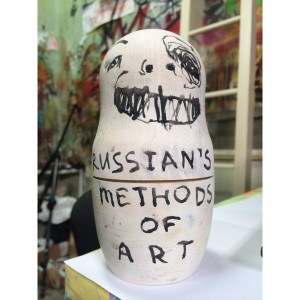Decoloniality. Easy, easy booby [laughs]. That’s the only method. It’s not an easy one.
So what is decoloniality? Decoloniality is the theory and practice to overcome western hegemony, but it’s a practice, it’s important to understand. It’s to remove all the legacy of colonialism. And those legacies are still so pervasive in today’s society, in today’s so-called like postcolonial societies.
Basically the legacies of colonialism are still very much alive and in all spheres of life. The way we love, the way we learn, the way we speak, the way we think, the way we move our bodies, the way we make love to people, the way we study, the way we work, the way we relate to each other, ourselves and the world, the earth and the universe, like everything has been contaminated by coloniality. And what is coloniality? It’s all the hierarchies that have been placed to organize society. So, we have hierarchies of- between people, according to race, according to gender, according to physical, mental abilities, according to class, according to belief system, according to profession and what not, you know. With of course like the white, male, able body, like financially stable, like heterosexual like person at the top of that pyramid making like all other form of existence less valuable. So, like intrinsically the society is built to make you feel, that you are less worthy of- of love and of being loved and of just living, just by the situation that you find yourself in. Then you have hierarchies between cultures, with again non-western cultures, being less like legit or valid or worthy of respect, you know. You can let people drown in front of you, it doesn’t matter, because they don’t belong to you, you know. And you have hierarchies of systems of knowledges. With, as we said earlier, like scientific, modern knowledge, being the pinnacle of what legitimate knowledge is or important knowledge is. And it’s all non-western knowledge being completely like devalued or worse like demonized, like actively demonized, you know. So then, what does it mean in your body, when you don’t belong to those top of hierarchies, you know? How does that make you feel? So that’s the work, you know, trying to understand like those feeling, that feeling of inadequacy, but that is actually politically designed for you to feel this way, you know. And so, removing all those layers of like shame.
Removing all this nonsense basically, like valuing yourself, respecting yourself, loving yourself, loving a plant like an animal, valuing their life, you know, valuing the spirits, your ancestors and our descendants. That is our work against coloniality, against all those mechanisms who have stripped us away from our ability to connect with the world, you know. And not just people that look like us, to like- the vastness of life. So that’s decoloniality, it’s doing this work actively in everything that you do. Like having that intention. I mean, that’s my methodology, that’s what I try to do in my work. I’m seeing like, how am I like embracing like the vastness of the power that are here and how I putting this power in service of the universe, not in service of like what coloniality is cherishing, which is greed like success, money, like fame, all of this. Non, like being in service of love, being in service of a community, of a prosperity, but prosperity in a soulful way, like being in service of the soul. That’s decoloniality for me, that’s- that’s my practice, my method, my everything. That’s- yes. That’s the work, that’s it, yes. It’s my mission, I’m here on a mission, like, yeah. I’m not here to play.

















